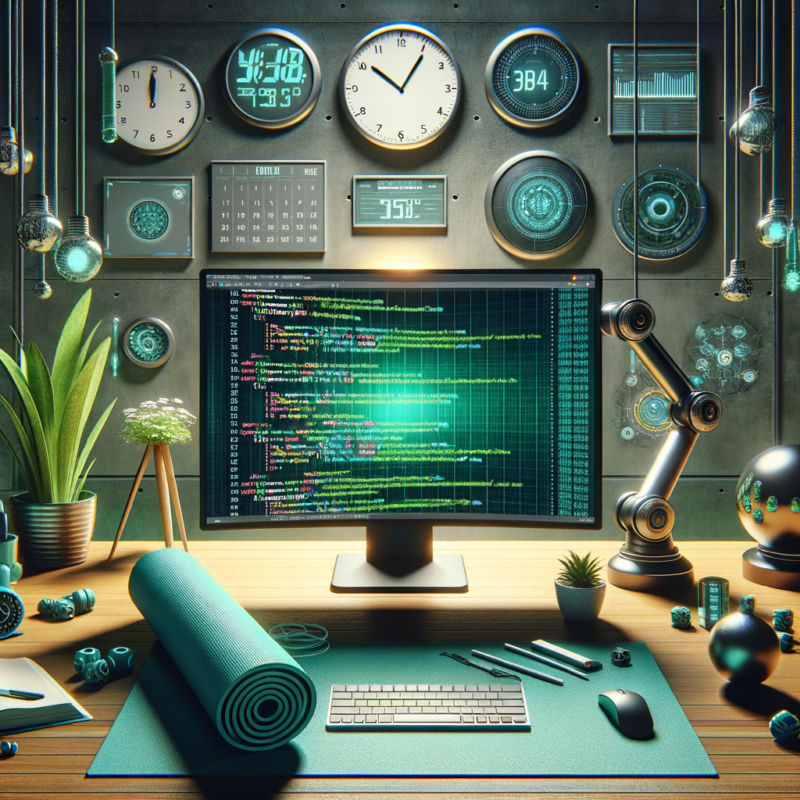Step into the world of software engineering at big tech giants like Meta, Amazon, and Google, and explore profound insights on achieving deep work and maximizing coding productivity. This blog is your quintessential guide, revealing effective techniques that are key to enhancing your output as a software engineer. Immerse yourself in a wealth of knowledge as you uncover how to leverage these strategies, akin to the practices of big tech software engineers, to delve deep into your work and turbocharge your coding efficiency. From time management theories, optimal workspace settings, cutting-edge coding tools, to mindfulness exercises, every aspect is designed to optimize your productivity. If you’re a software engineer striving for excellence, seeking the secret sauce of big tech coding productivity — this blog is your holy grail.
The Power of Deep Work in Coding: A Brief Introduction
Deep work, a term coined by productivity expert Cal Newport, refers to the ability to focus without distraction on a cognitively demanding task. In the software engineering world, deep work translates into writing intricate code blocks, debugging, or brainstorming solutions without distractions. The deep work philosophy aligns with the nature of coding where concentration and mental clarity are crucial.
Let’s dive into essential techniques that can help every software engineer maximize their coding productivity by achieving deep work.
Time Management Theories
When it comes to maximizing coding productivity, understanding and implementing time management theories can work wonders. Here are a few theories that can be particularly useful in a coding environment:
Pomodoro Technique
The Pomodoro Technique is a time management method that encourages people to work with the time they have, rather than against it. Here’s how to implement it:
• Choose a task to work on.
• Set a timer for 25 minutes and devote that time to the task.
• Take a short five-minute break when the timer goes off.
• Repeat the process. After completing four 25-minute work sessions, take a longer break.
This technique helps mitigate fatigue, and the regular breaks can refresh your mind, aiding in maintaining high levels of focus during coding.
Time Blocking
Like the Pomodoro Technique, time blocking involves dividing your day into chunks of time but on a larger scale. It’s about assigning specific work hours for different tasks or types of tasks, such as coding, meetings, learning, and relaxing. Ideally, high-priority tasks should be assigned to your most productive hours.
Creating an Optimal Workspace
Creating a conducive workspace is as equally important as mastering time management theories.
Organized Workspace
An organized workspace minimizes distraction and reinforces focus. Keep your workspace clean, well-lit, and free of clutter. Each item in your workspace should have a designated place, which will make it easier to find what you need and focus on the task at hand.
Proper Tools and Equipment
Your productivity can also be significantly boosted by the proper tools and equipment. A high-speed computer, a comfortable chair and table, multi-monitor setup, and a noise-cancelling headphone, among others, make coding more comfortable and efficient.
Ergonomic Considerations
Properly positioning your chair, table, mouse, keyboard, and monitor can reduce the risk of body strain and injury. An ergonomic setup not only promotes better physical health but also enhances productivity.
Utilizing Cutting-Edge Coding Tools
As a software engineer, leveraging coding tools effectively can have a significant impact on your productivity.
Integrated Development Environments (IDEs)
Choosing the right IDE according to your project requirements is crucial. IDEs provide a comprehensive set of coding tools in one unified environment, thus facilitating code writing, analysis, testing, and debugging.
Mindfulness and Breaks
Mindfulness and regular breaks enable rest and rejuvenation, helping maintain high focus levels throughout the day.
Mindfulness Exercises
Mindfulness exercises, such as meditation practices and breathing exercises, can help maintain mental clarity and reduce stress. These exercises can help you stay present and engaged with the task at hand, crucial for coding tasks that require deep work.
Regular Breaks
Regular breaks help prevent fatigue and increase productivity. During breaks, step away from your computer, do some light exercises, hydrate, grab a snack, or even do a quick mindfulness exercise.
In conclusion, as a software engineer looking to maximize productivity and achieve deep work, implementing these techniques and strategies can significantly aid your journey. By structuring your time effectively, creating an optimal workspace, leveraging innovative coding tools, and incorporating mindfulness practices, you can enhance your ability to do deep work and rocket your coding productivity.
Conclusion
Maximizing productivity and harnessing the power of deep work is a continuous pursuit for software professionals. It’s a mosaic of effective task management, curating the perfect workspace, leveraging cutting-edge tools, and mindful practices that can elevate a coder’s performance to unparalleled levels of productivity.
Strategically prioritizing tasks and managing time, using techniques such as the Pomodoro method or time blocking, can aid in curtailing distractions and preserving unwavering focus on the task at hand. The condition and arrangement of your workspace dramatically impact your productivity. A tidy, sufficiently illuminated, and ergonomically sound workspace that is equipped with the appropriate tools and equipment fosters healthy work habits and bolsters productivity.
In addition to the tangible environment, making the most of advanced resources like Integrated Development Environments (IDEs) streamlines the coding process by amalgamating essential functions in one user-friendly interface.
Of equal importance is the cultivation of mindfulness and the practice of taking consciousness-enhancing breaks. These habits foster mental clarity, ward off fatigue, and help manage stress levels. Mindfulness practices assist in staying rooted in the present moment and maintaining engagement, which is crucial for tasks as mentally demanding as coding.
In conclusion, in the competitive sphere of software development where productivity is paramount, achieving deep work is the culmination of various elements working in synergy. Balancing these disparate aspects can facilitate engineers to deliver their best performance, produce superior-quality work faster, thereby exemplifying the prowess of deep work in coding. As a software engineer, it’s essential to tailor these strategies, techniques, and tools to suit your unique work style for optimal benefit and to attain unprecedented levels of work satisfaction and output through deep work.
Bonus Content
• Embrace the right mindset: Your mindset plays a crucial role in achieving productivity. Cultivate resilience, a growth mindset, and a constant learning attitude for optimum output.
• Continuous learning: Adaptability is key in the tech world. Ensure you’re always up-to-date with the latest technology trends, programming languages, and performance-enhancing tools.
• Maintain work-life balance: While optimal productivity is the goal, it’s crucial to maintain a healthy work-life balance. Time for relaxation, hobbies, and personal development shouldn’t be compromised.
Additional Tips
• Ask for help: Don’t hesitate to ask for help from colleagues or superiors when you’re stuck. It can save you a lot of time and frustration.
• Automate repetitive tasks: Automation can be a genuine time-saver. Use your coding skills to automate mundane and repetitive tasks.
• Document your code: It may seem time-consuming, but this practice is invaluable for future reference and helps others who might work with your code.
• Master the art of debugging: Effective debugging skills can save a considerable amount of time. Understanding the problem thoroughly before jumping to solutions is vital.
• Practice regular refactoring: Regularly revisiting and refining your code helps maintain a clear and clean codebase and boosts overall productivity.






